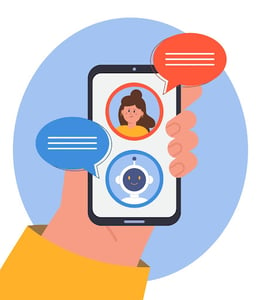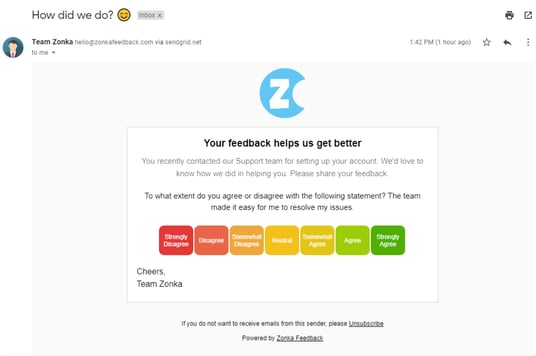Artificial Intelligence is set to empower the customer service teams. Check out ways in which AI is impacting customer service & how you can use it too.
Artificial Intelligence (AI) is prevalent in many industries and becoming integral to business processes. Industries like telecommunications, oil, gas, energy, aviation, and healthcare are all finding ways to utilize artificial intelligence. And the customer service sector is no different.
Artificial Intelligence is making its way into the customer service sector, and the impact is going to be massive.
Measure Customer Service Feedback
With CES & Helpdesk Surveys, understand your customer's experience with the customer service team and issue resolution.

In customer service, there are many benefits of artificial intelligence, such as faster response times, data-driven processes, and personalized customer experience. Keep reading to learn how artificial intelligence is already impacting customer service. Moreover, AI can help businesses gain valuable insights into customer behavior and preferences. By analyzing customer reviews and feedback, businesses can identify patterns and trends and make data-driven decisions to improve their products and services. This, in turn, can lead to higher customer satisfaction and loyalty.
Table of Content
Impact of AI on Customer Service
The impact of AI on customer service cannot be overstated. With its ability to analyze vast amounts of data and provide real-time insights, artificial intelligence has revolutionized the way businesses interact with their customers. As technology continues to advance, AI will become even more sophisticated, enabling businesses to provide even more personalized and efficient customer experiences. From predictive analytics to voice recognition and natural language processing, AI development services will continue to shape the way businesses interact with their customers.
Discussed below are some of the key ways in which AI is impacting customer service.
1. Data-Driven Designs
Most businesses today understand that data is everything, as analytics can help companies make informed decisions to improve operations and the customer experience. AI can collect excessive data to help companies improve in several ways and enhance their customer service performance.
a. Insight into Customer Habits and Patterns
Analyzing customer habits, patterns, and preferences is essential for consumer-facing businesses. But with AI, gaining nuanced insights into customer behavior is straightforward and comprehensive. AI programs can automatically assess massive amounts of data and draw helpful conclusions in seconds.
b. Predictive Market Insights
AI can also offer market predictions, such as potential trends, events, manage these demands, and sentiments, using the gargantuan sets of data it collects. Including AI, there are several innovative technologies for business insights that can help you drive better service in terms of customer satisfaction. While these predictions are not guaranteed, they can help companies capitalize on their competition.
.png?width=750&height=542&name=Section%207-%20Take%20Feedback-led%20%26%20Data-driven%20Decisions-min%20(1).png)
c. Performance Metrics
Aside from helping businesses understand customers better, AI can also help companies understand their performance.
AI-gathered data can show things like average customer wait time, percentage of customer complaints solved, social media prevalence, ticket reopens, resolution times, and other customer service metrics and customer satisfaction metrics. These metrics make it easy to improve customer service operations.
2. More Efficient Customer Assistance
AI speeds everything up, including customer service. By leveraging AI in customer service, businesses can streamline their operations, improve response times, and provide personalized assistance. The efficiency gained through AI not only benefits the business but also enhances the overall customer experience, leading to increased customer satisfaction and loyalty. As AI continues to advance, we can expect even more innovative solutions that revolutionize the way businesses interact with their customers.
Below are the top ways AI can make customer service more efficient.
a. Chatbots and Auto-Replies
If you’ve visited any business website in the last three years, you’re likely familiar with the little chatbots that pop up on the screen and ask if you need help.
These customer service chatbots and email auto-replies offer customers immediate help to find answers faster. And they’re highly advanced, so they can answer a wide range of programmed questions and improvise when necessary.
Chatbots and auto-replies utilize Natural Language Understanding (NLU), so customers can type questions and responses instead of choosing from a preset list of options. AI chatbots can also reply with human-like language, making customers feel more cared for.
b. 24/7 Assistance
Chatbots, auto-replies, and other AI-powered customer assistance tools are available 24/7, so customers can get help immediately. With AI, customers don’t have to wait for business hours or an available human to receive help.
Faster help can improve overall customer satisfaction and increase profits. If a customer has to wait 24+ hours for an answer, they may move on to a different business to fulfill their needs. This is one of the best ways to use AI for customer experience.

c. Assistance Options
AI in customer service has allowed customers to choose how they receive assistance, making the experience more convenient and personalized. Many companies offer phone, text, chat, email, or in-app assistance so that customers in need can choose the ideal path of communication for them.
3. Personalized Consumer Experience
Along with customer service assistance options, AI tailors the consumer experience to each individual in numerous ways. Every customer wants to feel valued, and AI helps businesses offer each customer their own experience. Not just improving the experience, AI, when clubbed with other tools, can also help in overall customer experience management.
a. Product or Service Suggestions
When you visit a site like Amazon, you may feel like every product on the home page was designed for you. AI gathers data on shopper preferences and patterns to personalize suggestions and home pages to cater to that particular customer, elevating the experience and increasing sales potential. So this AI capability helps customers and companies.
b. Targeted Campaigns
Consumers can feel bombarded or even harassed by spam emails for sales and new products from every company they’ve ever given their email. AI can create targeted campaigns, so customers only get emails about products or services that would interest them based on shopping habits. Again, this improves the customer experience while increasing sales potential.
c. AI-Assisted Decisions
This AI feature is not commonplace but is becoming more popular among retail businesses. One of the most common examples of AI-assisted purchase decisions is when people use Alexa to order groceries.
AI-assisted purchase decision programs are still flawed, but they’re on their way to becoming the standard of online shopping. As AI can support marketing decisioning, businesses can leverage it to optimize customer journeys, reducing the need for humans to browse and research products and services manually.
4. Enhanced Human Interactions
AI is not here to necessarily replace humans. Instead, AI is a brilliant tool to help humans do their jobs better. Customer service agents can work efficiently and focus on more complex tasks with the help of AI programs that can handle more straightforward tasks.
a. CRM Integrations
AI can efficiently work with Customer Relationship Management (CRM) systems. These integrations mean customers can be quickly routed to the correct agents to receive help, and customer agents can better prepare to help a customer.
Instead of asking customers about their purchase history, address, and other small details, agents will have this information before they speak with them. In fact, many NPS tools for Salesforce, Pipedrive, and other CRMs are coming with native integration and AI capabilities that help assess an agent's performance and assist them in improving their overall performance.
b. Chatbot Assistance
In customer service, AI can offer customer service representatives reply suggestions, so they can answer and help customers faster. Customers don’t have to wait as long for assistance, and representatives don’t waste time typing and proofing replies, giving them more time to focus on finding a solution.
c. Email Tagging
Email tagging is a way to organize customer emails so they can be addressed faster and by the correct people. AI programs can scan emails, tag them accordingly, and send them to the appropriate office or agent so emails don’t sit in limbo or bounce around offices.
5. Lower Customer Service Costs
AI can help keep business costs down. Many companies pay for call centers, extra employees, overtime, and other costs associated with customer service. But AI can cut these costs by simplifying the customer service process as much as possible.
a. Decreased Need for Call Centers
Many companies outsource their customer service needs to call centers because they don’t have a robust in-house team to handle all the calls. Even companies with customer service agents may need to outsource because of high call volume. But AI can answer simple customer queries, reducing the need for call centers and saving the company money.
Also read benefits of VOIP for costumer and call centers.
b. Simple Task Management
Some customer calls are effortless and don’t require a human, which is where AI comes in. For example, if a customer calls a business to ask about their hours, an AI bot can handle this. But if a customer calls because their order was wrong, late, or lost, these situations can be more complex, requiring human help.
If human agents don’t have to answer simple calls, they have more time to focus on complicated customer problems. So, all customers receive prompt help, improving overall customer satisfaction. Simple task management means you don’t need call centers or a massive customer service team.
c. More Productive Staff
As mentioned, AI allows agents to focus on complex tasks, helping staff e more productive. Not only does AI ensure humans are focused on tasks that require more tact, but it can also improve employee satisfaction. When customer service agents are happy, they can better attend to customer needs.

Helping customers with genuine problems instead of answering basic questions all day can make employees feel more valuable and engage them better. You need fewer employees to accomplish the same job, saving the company labor costs.
The Future of AI in Customer Service
Both large and small companies can utilize AI to enhance customer service and maximize efficiency.
As AI progresses, it will become a significant aspect of customer service, helping customers and agents. It can reduce customer service costs, increase sales, and improve customer and employee satisfaction.











